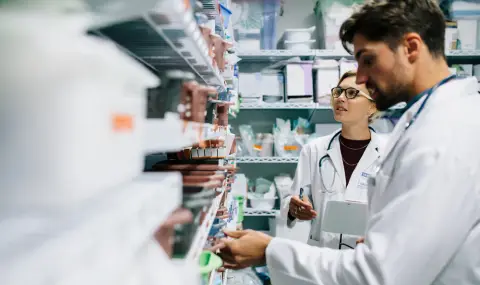They cost cents and yet are currently difficult to find: recently, saline solutions have become a scarce commodity in German hospitals and pharmacies, even though they are needed for operations, irrigations, infusions. According to Thomas Price, head of the North Rhine-Westphalian Pharmacists' Association, the situation has worsened dramatically in recent months. "What has been a major problem in hospitals for months is now also affecting outpatients," he told the "Rheinische Post" newspaper.
The North Rhine-Westphalian Ministry of Health confirms that such a problem exists. "Clinics in North Rhine-Westphalia and Germany have been receiving 80% of the medicines they need for several months, and recently only around 50%," he said in a statement. And according to the Federal Institute for Drugs and Medical Devices, this situation will continue for months to come.
A well-known problem
In recent years, Germany has repeatedly experienced shortages of medicines such as antibiotics and medicines for children. With serious consequences: according to a survey this spring among members of the Professional Association of Pediatricians and Adolescent Doctors, around a third of them are convinced that this threatens the quality of treatment.
In addition, treatment is taking longer and longer, as doctors have to check in advance which medicines are available, the survey also shows. The German Pharmacists' Association believes that there are problems with around 500 prescription medicines. A similar problem exists in other EU countries, such as Sweden, Portugal and Spain, according to a study conducted by the PGEU (Pharmaceutical Group of the European Union) in 2023.
Cheap active ingredients from China and India - but at what cost?
The reasons for the shortage are complex, just like the production of medicines today. While Germany, with its large pharmaceutical companies such as Bayer, BASF, Boehringer Ingelheim and BioNTech, was once considered the "pharmacy of the world", production is now divided and scattered around the world, making supply chains long and uncertain.
The majority of active ingredients are now produced in China and India. Not only are wages lower there, but environmental regulations do not play the same role as in Europe. In order to make substances even cheaper, mass production and monopolization are resorted to. This means that fewer and fewer suppliers are producing larger quantities. "For example, while we used to have ten suppliers of paracetamol syrup for fever, today there is only one main supplier left," Professor David Frankas, a supply chain expert at the University of Applied Sciences in Worms, told DW.
"We are dependent on only a few manufacturers. And if one of them breaks down, the entire supply chain breaks down," explains Professor Ulrike Holzgrabe, an expert in pharmaceutical and medicinal chemistry at the University of Würzburg. "If there are small disasters along the supply route, such as the closure of the Shanghai port during the coronavirus pandemic or a stranded ship halting traffic through the Suez Canal, then the goods don't reach us."
Why it's hard to find solutions
However, the problem can be exacerbated not only by the division of production, but also by low inventory levels. Short-term shortcomings in the production chain cannot simply be compensated for.
According to experts, increasing stocks is expensive. Storage facilities cost money, and it is also uncertain whether the stored drugs will be sold. Demand fluctuations are huge: during the coronavirus pandemic, for example, demand at Infectopharm collapsed as the widespread wearing of masks led to a sharp decline in several other infectious diseases. The company had to destroy expensive antibiotic syrups for children because it couldn't sell them. Two years later, demand is rising again.
There's another thing: with generic drugs, i.e. imitation products, which account for about 70-80% of the main supply, the profit is extremely low. Discount contracts and other agreements that were introduced into the German health system years ago force manufacturers to produce as cheaply as possible.
This is not the only reason why it will probably be difficult to move production back to the EU - which many are calling for. The production of fine chemicals for active ingredients will also be hampered. "We have created such environmental legislation that it is almost impossible", says Holzgrabe. In any case, this would not be a solution for the coming winter. "It takes at least five years to restore production capacity in this industry", says supply chain expert Prof. Frankas.
Author: Stephanie Höpner
